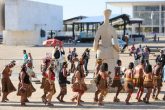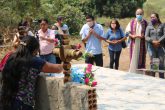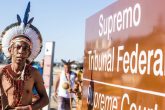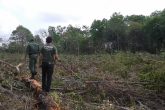Report no. 923: Date and location set for Acampamento Terra Livre 2010
During a meeting of indigenous leaders this week in Brasilia, the Articulation of Indigenous Peoples of Brazil (APIB) assessed the progress of the national indigenous movement and defined the agenda of the Acampamento Terra Livre 2010. This year’s event will be held in Campo Grande, Mato Grosso do Sul, between August 16th and 20th.
The event, which occurs once a year, seeks to promote a debate on the territorial question of the Kaiowá Guarani and Terena peoples in the Brazilian state of Mato Grosso do Sul. During the meeting, topics will also be discussed such as the criminalization of the indigenous peoples of northeast region of the country, the impacts on indigenous lands of agribusiness, extraction of timber and minerals and the large infrastructure construction enterprises being planned by the Program for Acceleration of Growth (PAC) of the Brazilian government, such as the Belo Monte hydroelectric dam.
Acampamento Terra Livre is an opportunity for indigenous peoples to position themselves, express their opinions, and primarily attempt a new dialogue with the government on these issues, as their right to prior consultation has not been respected, even though guaranteed by the Federal Constitution, ILO Convention 169 and the UN Declaration on the Rights of Indigenous Peoples.
Acampamento Terra Livre
Acampamento Terra Livre will take place in Mato Grosso do Sul (MS), the region of the country which concentrates the highest rate of violence against the indigenous peoples. In last year alone, 33 indigenous people were murdered in this state, according to the Report on Violence Against Indigenous Peoples in Brazil – 2009, recently released by the Indigenous Missionary Council (CIMI).
The situation of violence in MS is directly linked to conflicts over land possession. On one side are the large-scale land owners, cultivators of monoculture soybean, sugarcane and large herds of cattle, for a large part destined for export. On the other, diverse indigenous communities who claim possession of their traditional lands.
Land conflicts and violence committed against the Guarani, characterized as institutional racism by the researcher Iara Bonin and genocide by the anthropology professor Lucia Helena Rangel, triggered the transfer of the yearly Camp to the state.
The Guarani are the second largest indigenous population in the country. Approximately 45,000 people of this indigenous ethnic group live in MS without counting the Terena, Kadiwéu and Xinikinawa, among others. These communities live confined to small portions of land or simply encamped at the side of roads in the region.
Mobilization against Belo Monte
Preceding the Acampamento Terra Livre, the Coordination of Indigenous Organizations of the Brazilian Amazonia (Coiab) will promote a meeting to mobilize the indigenous peoples of the Xingu River Basin against the construction of the Belo Monte hydroelectric dam. The event will be held between 9 and 12 August in Altamira, in Pará.
The indigenous leaders from all states of the Amazon will be invited to attend the event. According to Marcos Apurinã of Coiab, they will present the problems and challenges experienced by their peoples, but with a focus on the central issues related to Belo Monte.
The discussions and advices from this mobilization will also be taken to the Acampamento Terra Livre in Campo Grande.






